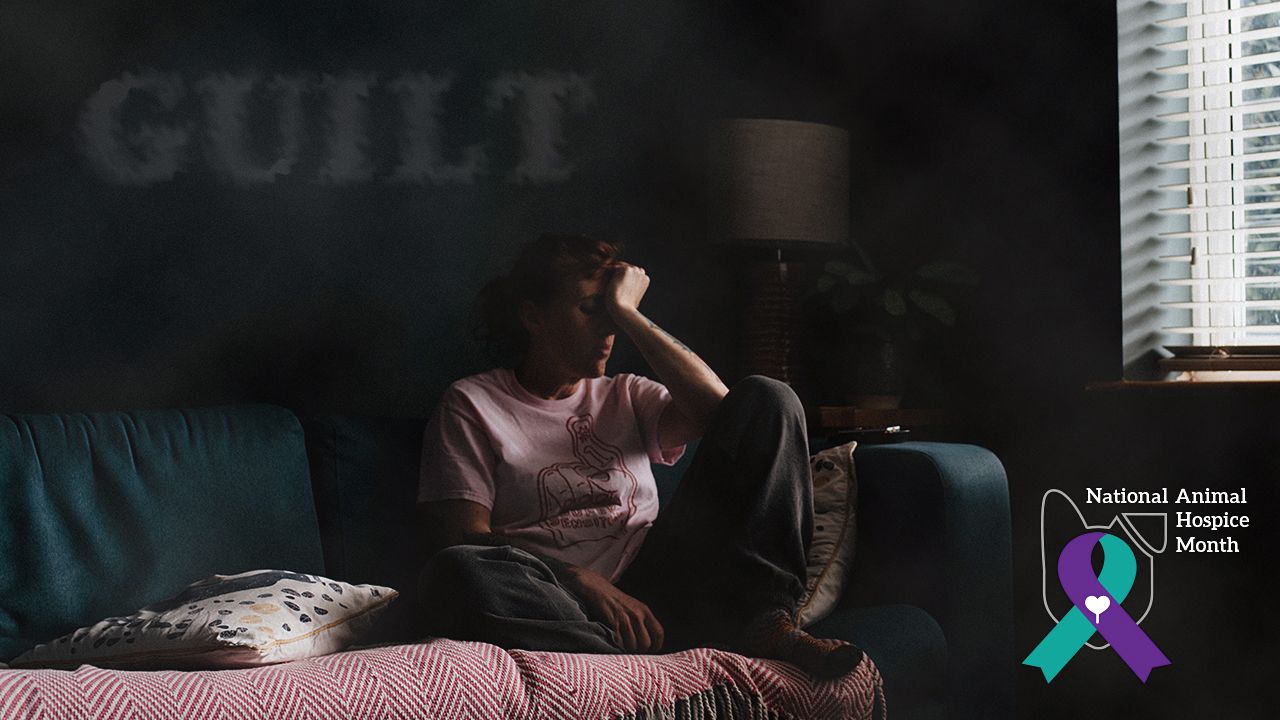
Letting Go of Guilt in Animal Hospice Care:
Breaking the ties that bind us
By Michelle Nichols, MS, CAHP
Animal Hospice Group Co-founder & Instructor/Lecturer
Why is it so common to experience overwhelming guilt after the death of a beloved animal companion? While working with families, Certified Animal Hospice Practitioners (CAHPs) know that animal caregivers often express a profound sense of guilt, regardless of the circumstances surrounding their pet's passing. How can CAHPs help them overcome these emotions if, looking back, they recognize they strayed from what they once had declared their "Path of Least Regrets?" We can guide pet parents as we empower them to move beyond this guilt and constant "woulda-shoulda-coulda" mentality that can plague their minds.
|
When a cherished animal companion passes away, it is natural to second-guess decisions, pondering notions like, "What if I had chosen a different treatment option?" or "If only I had taken them to the vet sooner." Though often distorted by grief, these recurring thoughts are not always grounded in reality. Despite our rational thinking, why do we succumb to these feelings? The answer is not universally clear. Interestingly, parents of young children in the midst of illness and death share similar sentiments. The common thread lies in the dependency of both children and animals, who rely on us for every aspect of their well-being. Yet, acknowledging the normalcy of these emotions does not always alleviate the burden. |

Word cloud: https://www.presentermedia.com/ |
People tend to blame themselves for their pet's suffering or death, seeking answers to the unanswerable question: "Why did my pet have to die?" It is human nature to try to find a cause, an action, or an oversight to explain the inexplicable, especially when faced with devastating events. However, sometimes life unfolds without reason or predictability, and accepting this harsh reality is daunting. Even if a caregiver provided unwavering love and care throughout their animal companion's entire life, guilt and regret would be inevitable. These emotions are intrinsic to the human experience and integral to grieving a beloved.
To navigate the journey of grief and find healing, we must confront the barriers hindering our progress, with guilt being a significant obstacle. It is crucial to discern between "usable" guilt, which fosters growth and learning, and excessive guilt, which erodes self-esteem and stifles personal development. In his highly acclaimed bestseller, When Bad Things Happen to Good People, Rabbi Harold Kushner emphasizes the importance of an appropriate sense of guilt, which motivates us to improve. Excessive guilt, on the other hand, diminishes our self-worth and hampers our ability to heal and move forward.
Certified Animal Hospice Practitioners possess the tools to guide caregivers in addressing this guilt effectively. They know how to present to animal caregivers deliberate actions that can lead to forgiveness, such as acknowledging their emotional experience, writing down their feelings, and–often helpful for many–sharing their reality and perceptions with others. CAHPs can remind caregivers to trust that they made the best decisions based on the knowledge and resources available to them at that moment in time. They can help them review the choices they made, which were guided by the heart, and praise the intuition that allowed them to do their best through moments of anxiety and crisis. While hindsight offers new perspectives, CAHPs can cue caregivers to remember that it all comes down to the forgiveness that is essential for healing and growth.
When overwhelming guilt threatens to consume the caregiver who is being guided, CAHPs can explain that breaking the cycle of self-blame requires consistent effort and a conscious rewiring of their darker thought patterns. They can then encourage caregivers to interrupt those negative thoughts with empowering mantras such as:
- "I did my best given the circumstances."
- "I cannot change what happened."
- "My beloved companion knew my love."
- "My animal wouldn't want me to suffer. I choose healing for their sake."
Essentially, forgiveness becomes the most precious gift they can bestow upon themselves during this grieving process. Caregivers may need to be reminded that throughout their own lifetime, they showered their animal companions with unconditional love and forgiveness and embraced them despite their mischief or mistakes. Now, they can be gently cued to extend that same compassion to themselves as they grapple with their broken heart. After all, their beloved pet would only wish everlasting happiness and peace for their human best friend and guardian.
If we, as CAHPs, possess unresolved feelings of our own past guilt, we must break the ties that bind us so we can help others. Personally, I have found solace in embracing lessons learned from this experience. Though they may have been heart-breaking at that time, in retrospect, I prefer to view them as my beloved pet's enduring legacy and gift to me. Ultimately, it is their unconditional friendship that inspires me to navigate my own healing journey with love, forgiveness, and gratitude.
What do you think? What tactics have helped you to help others overcome their guilt? What has helped you confront your own feelings of guilt? To help spread awareness during National Animal Hospice Month, please enter your comments below and share this blog on Facebook, Instagram, or LinkedIn. I welcome your comments privately too; my virtual door is open at [email protected] To learn more about AHELP Project, please visit https://www.ahelpproject.org/.
Please show us all that you like this article by sharing, commenting, and/or giving this a "LIKE" on Facebook. Blog post banner: Grief (Photo credit: Annie Spratt, Unsplash). Click here to read Michelle’s previous blog posts.

